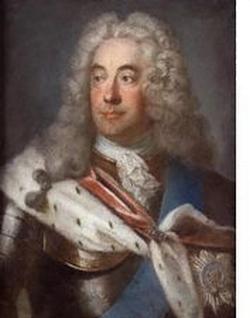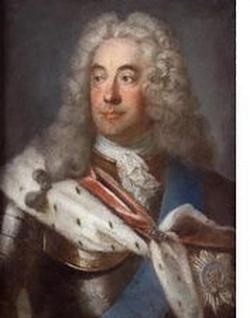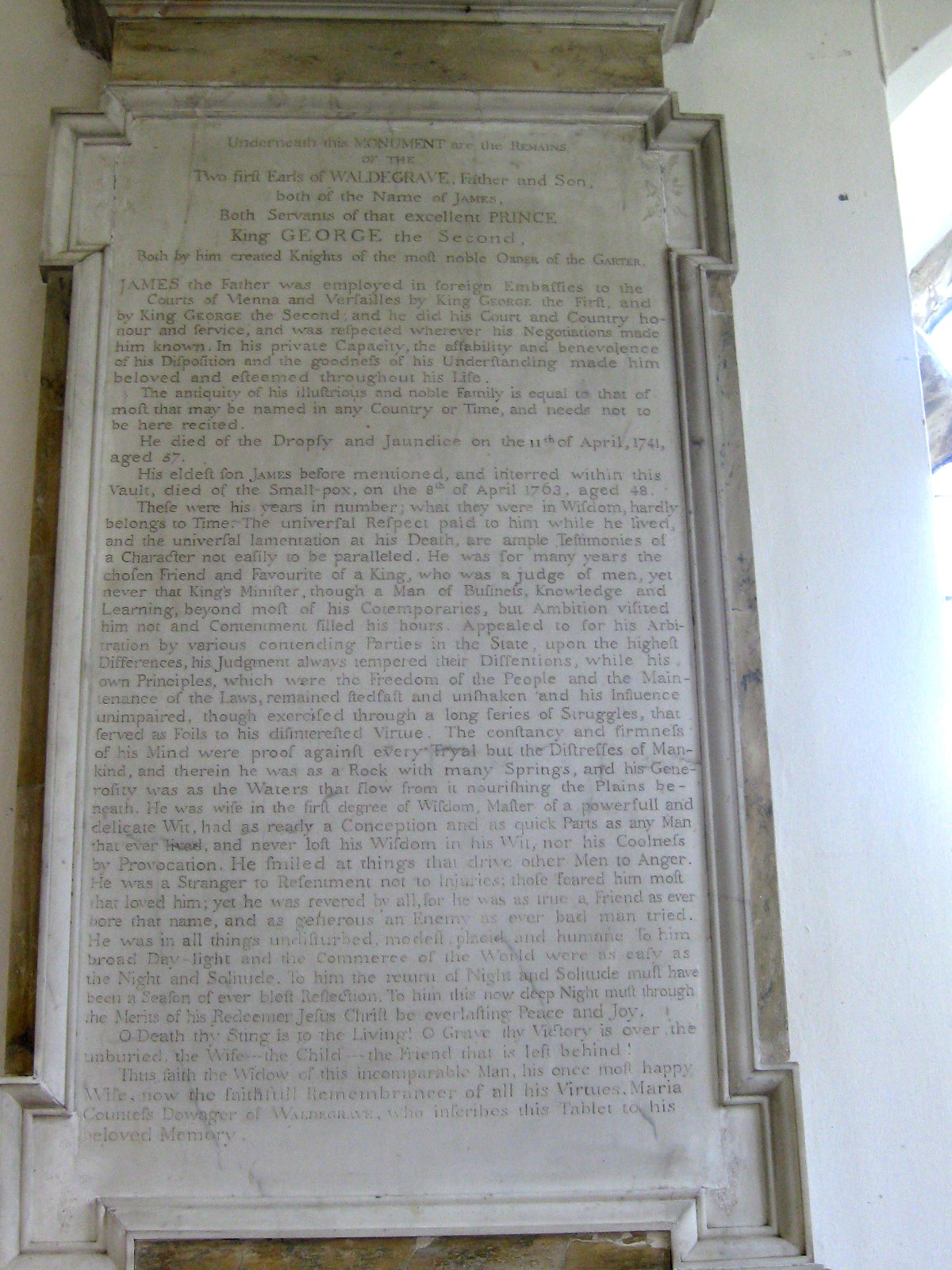Waldegrave was the son of the 1st Baron Waldegrave and Henrietta FitzJames, the illegitimate daughter of James II and Arabella Churchill.
Waldegrave inherited his father's title in 1690 and on 20 May 1714, he married Mary Webbe (who died in childbirth in 1719), the second daughter of Sir John Webb of Hatherop, Gloucestershire, 3rd Baronet and they had three surviving children:
* Hon. James Waldegrave (1714–1763)
* Hon. John Waldegrave (1718–1784)
* Lady Henrietta Waldegrave (1717–1753), married firstly, Lord Edward Herbert, a son of the 2nd Marquess of Powis and had issue; married secondly, John Beard (a singer at Covent Garden).
After the death of his wife, he converted from Roman Catholicism (the religion he was brought up with) to Anglicanism in order to take his seat in the House of Lords. He was briefly a Lord of the Bedchamber in 1723 and then from 1730–41 and Ambassador to Austria from 1727–30 and to France from 1730–40. During his ambassadorship to France, he still spent enough time in London to be one of the founding Governors of the new charity there, known as the Foundling Hospital (created in 1739). In 1729, he had been created Earl Waldegrave and on his death in 1741, was succeeded by his eldest son, James.
Waldegrave was the first person to discuss what would become game theory in a 1713 letter concerning the card game le Her.
Bio by Anne Stevens
Waldegrave was the son of the 1st Baron Waldegrave and Henrietta FitzJames, the illegitimate daughter of James II and Arabella Churchill.
Waldegrave inherited his father's title in 1690 and on 20 May 1714, he married Mary Webbe (who died in childbirth in 1719), the second daughter of Sir John Webb of Hatherop, Gloucestershire, 3rd Baronet and they had three surviving children:
* Hon. James Waldegrave (1714–1763)
* Hon. John Waldegrave (1718–1784)
* Lady Henrietta Waldegrave (1717–1753), married firstly, Lord Edward Herbert, a son of the 2nd Marquess of Powis and had issue; married secondly, John Beard (a singer at Covent Garden).
After the death of his wife, he converted from Roman Catholicism (the religion he was brought up with) to Anglicanism in order to take his seat in the House of Lords. He was briefly a Lord of the Bedchamber in 1723 and then from 1730–41 and Ambassador to Austria from 1727–30 and to France from 1730–40. During his ambassadorship to France, he still spent enough time in London to be one of the founding Governors of the new charity there, known as the Foundling Hospital (created in 1739). In 1729, he had been created Earl Waldegrave and on his death in 1741, was succeeded by his eldest son, James.
Waldegrave was the first person to discuss what would become game theory in a 1713 letter concerning the card game le Her.
Bio by Anne Stevens
Inscription
Underneath this monument are the remains of the two first Earls of WALDEGRAVE.
Father and son both of the name of JAMES both servants of that excellent Prince King George the Second both by him created Knights of the most noble Order of the Garter.
JAMES, the father, was employed in foreign embassies to the Courts of Vienna and Versailles by King George the First, and by King George the Second; and he did his Court and country honour and service, and was respected wherever his negotiations made him known. In his private capacity, the affability and benevolence of his disposition and the goodness of his understanding, made him beloved and esteemed throughout his life. The antiquity of his illustrious and noble family is equal to that of most that may be named in any country or time, and needs not to be here recited He died of the dropsy and jaundice on the 11th of April 1741 aged 57.
His eldest son, JAMES before mentioned and interred within this vault died of the small pox, on the 8th of April 1763 aged 48. These were his years in number; what they were in wisdom hardly belongs to time. The universal respect paid to him while he lived and the universal lamentation at his death are ample testimonies of a character not easily to be paralleled. He was for many years the chosen friend and favourite of a King, who was a judge of men; yet never that King's Minister, though a man of business knowledge and learning beyond most of his contemporaries, but ambition visited him not, and contentment filled his hours. Appealed to for his arbitration by various contending parties in the state, upon the highest differences, his judgement always tempered their dissentions, while his own principles, which were the freedom of the people, and the maintenance of the laws, remained stedfast and unshaken,and his influence unimpaired, though exercised through a long series of struggles that served as foils to his disinterested virtue. The constancy and firmness of his mind were proof against every tryal but the distresses of mankind; and therein he was as a rock with many springs, and his generosity was as the waters that flow from it, nourishing the plains beneath. He was wise in the first degree of wisdom; master of a powerfull and delicate wit; had as ready a conception, and as quick parts as any man that ever lived, and never lost his wisdom in his wit, nor his coolness by provocation. He smiled at things that drive other men to anger. He was a stranger to resentment, not to injuries, those feared him most that loved him, yet he was revered by all, for he was as true a friend as ever bore that name, and as generous an enemy as ever bad man tried. He was in all things undisturbed, modest, placid and humane. To him broad day-light and the commerce of the world were as easy as the night and solitude. To him the return of night and solitude must have been a season of ever blest reflection. To him this now deep night must through the merits of his Redeemer, Jesus Christ, be everlasting peace and joy, O death! thy sting is to the living! O grave thy victory is over the unburied the wife, the child, the friend that is left behind. Thus saith the widow of this incomparable man, his once most happy wife, now the faithful remembrancer of all his virtues, MARIA Countess Dowager of WALDEGRAVE, who inscribes this tablet to his beloved memory.
Family Members
Advertisement
Advertisement





